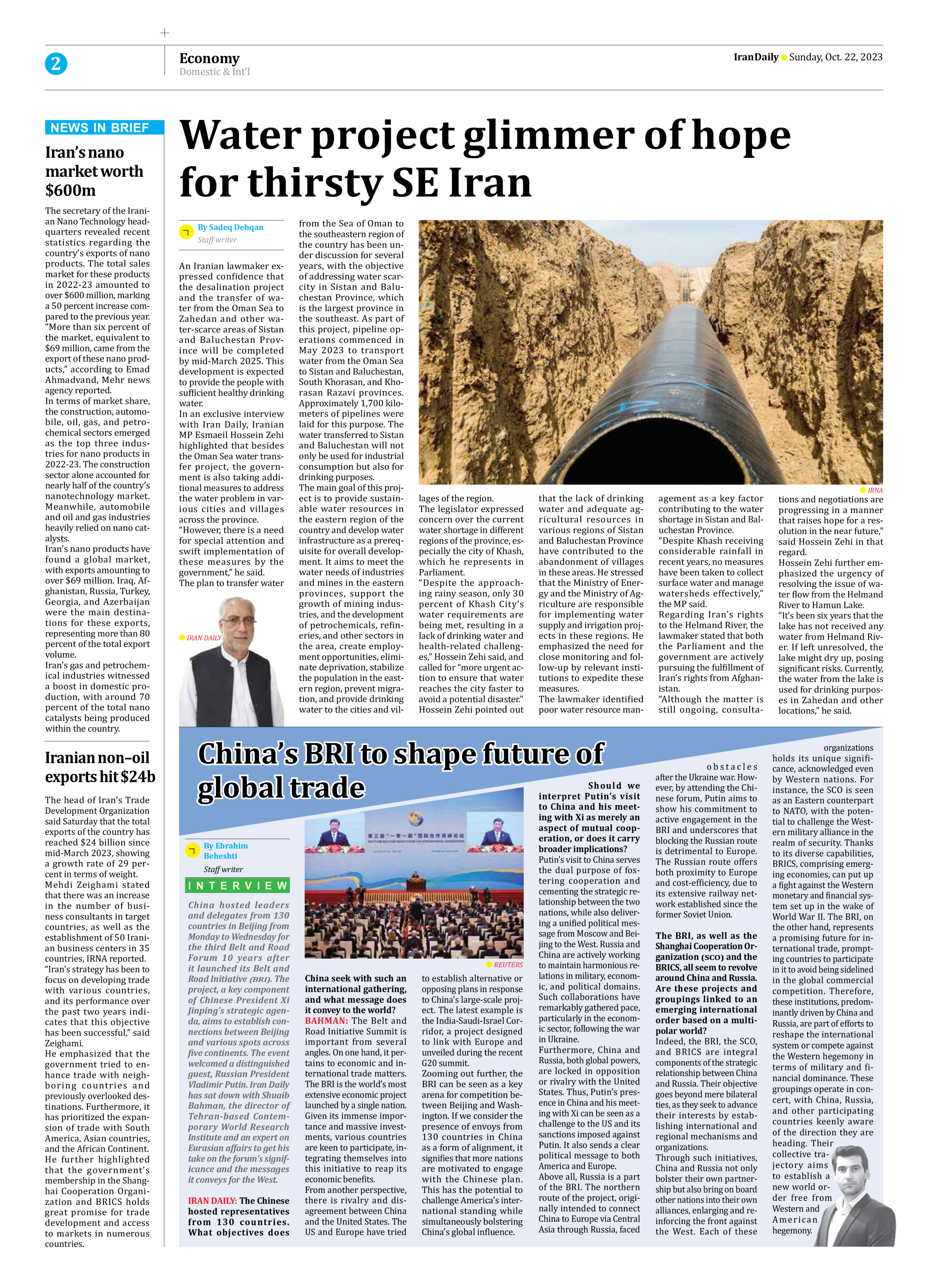
Water project glimmer of hope for thirsty se Iran
By Sadeq Dehqan
Staff writer
An Iranian lawmaker expressed confidence that the desalination project and the transfer of water from the Oman Sea to Zahedan and other water-scarce areas of Sistan and Baluchestan Province will be completed by mid-March 2025. This development is expected to provide the people with sufficient healthy drinking water.
In an exclusive interview with Iran Daily, Iranian MP Esmaeil Hossein Zehi highlighted that besides the Oman Sea water transfer project, the government is also taking additional measures to address the water problem in various cities and villages across the province.
“However, there is a need for special attention and swift implementation of these measures by the government,” he said.
The plan to transfer water from the Sea of Oman to the southeastern region of the country has been under discussion for several years, with the objective of addressing water scarcity in Sistan and Baluchestan Province, which is the largest province in the southeast. As part of this project, pipeline operations commenced in May 2023 to transport water from the Oman Sea to Sistan and Baluchestan, South Khorasan, and Khorasan Razavi provinces. Approximately 1,700 kilometers of pipelines were laid for this purpose. The water transferred to Sistan and Baluchestan will not only be used for industrial consumption but also for drinking purposes.
The main goal of this project is to provide sustainable water resources in the eastern region of the country and develop water infrastructure as a prerequisite for overall development. It aims to meet the water needs of industries and mines in the eastern provinces, support the growth of mining industries, and the development of petrochemicals, refineries, and other sectors in the area, create employment opportunities, eliminate deprivation, stabilize the population in the eastern region, prevent migration, and provide drinking water to the cities and villages of the region.
The legislator expressed concern over the current water shortage in different regions of the province, especially the city of Khash, which he represents in Parliament.
“Despite the approaching rainy season, only 30 percent of Khash City’s water requirements are being met, resulting in a lack of drinking water and health-related challenges,” Hossein Zehi said, and called for “more urgent action to ensure that water reaches the city faster to avoid a potential disaster.”
Hossein Zehi pointed out that the lack of drinking water and adequate agricultural resources in various regions of Sistan and Baluchestan Province have contributed to the abandonment of villages in these areas. He stressed that the Ministry of Energy and the Ministry of Agriculture are responsible for implementing water supply and irrigation projects in these regions. He emphasized the need for close monitoring and follow-up by relevant institutions to expedite these measures.
The lawmaker identified poor water resource management as a key factor contributing to the water shortage in Sistan and Baluchestan Province.
“Despite Khash receiving considerable rainfall in recent years, no measures have been taken to collect surface water and manage watersheds effectively,” the MP said.
Regarding Iran’s rights to the Helmand River, the lawmaker stated that both the Parliament and the government are actively pursuing the fulfillment of Iran’s rights from Afghanistan.
“Although the matter is still ongoing, consultations and negotiations are progressing in a manner that raises hope for a resolution in the near future,” said Hossein Zehi in that regard.
Hossein Zehi further emphasized the urgency of resolving the issue of water flow from the Helmand River to Hamun Lake.
“It’s been six years that the lake has not received any water from Helmand River. If left unresolved, the lake might dry up, posing significant risks. Currently, the water from the lake is used for drinking purposes in Zahedan and other locations,” he said.







